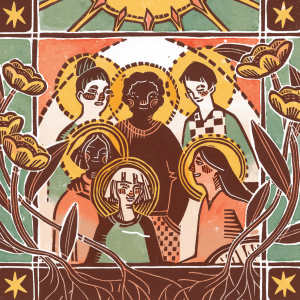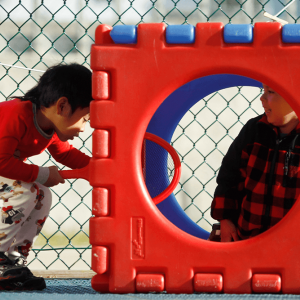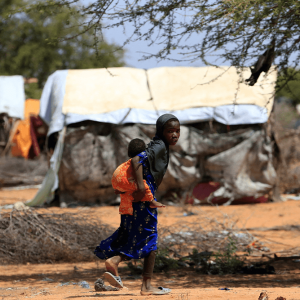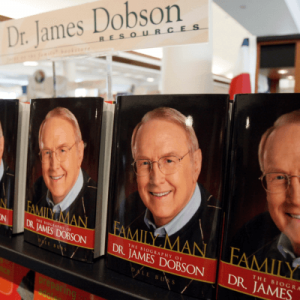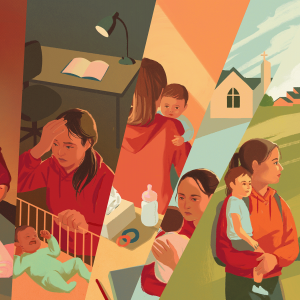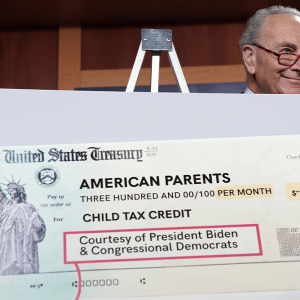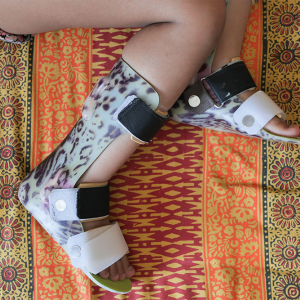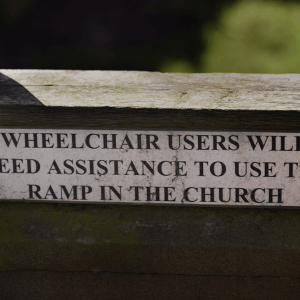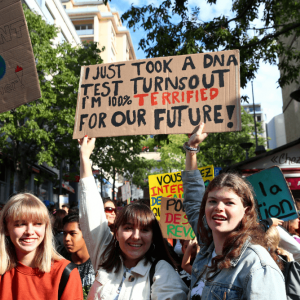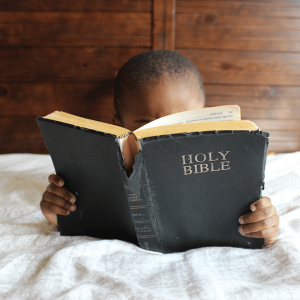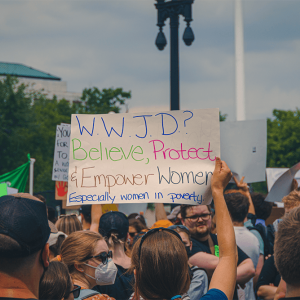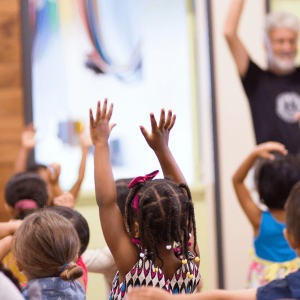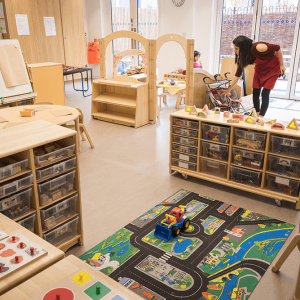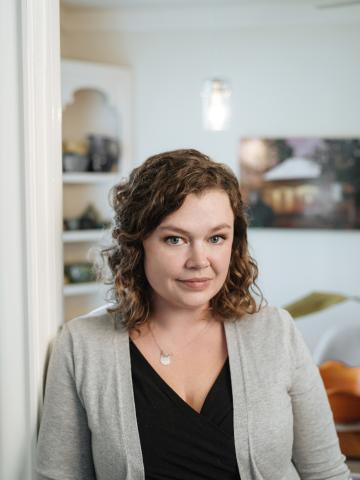
Bekah McNeel is a freelance journalist living in San Antonio. She reports on the intersection of faith and early childhood for Sojourners. In addtion, she reports on education, immigration, and religion and has been published with Christianity Today, Texas Monthly, and Texas Tribune. She is the author of Bringing Up Kids When Church Lets You Down: A Guide for Parents Questioning Their Faith, from Eerdmans. She can be found on Twitter at @BekahMcneel and on her blog at www.bekahmcneel.com.
Posts By This Author
What Do Toddlers Learn in Church?
I asked my 3-year-old niece, Ember, what she learned in church. She said she learned about Jesus. “Who is Jesus,” I asked. “Where does he live?” She looked at me like I was an idiot, and then said, “Jesus is in our heart. Jesus helps us not be scared and not be afraid.”
Should Christians Heed the Pope’s Call to Ban Surrogacy?
When Pope Francis called for a global ban on surrogacy during a foreign policy address last month, non-Catholics, especially those in the United States, may have felt the subject came out of nowhere. Surrogacy is medically and legally regulated in the U.S. as an intervention recommended by the American Society for Reproductive Medicine for those who do not have the ability to become pregnant or carry a pregnancy to term. But the pope’s concern was beyond the ethics of procreation, as he positioned his pronouncement within the context of a global economy and exploitation of women.
“A child is always a gift and never the basis of a commercial contract,” Francis said. “At every moment of its existence, human life must be preserved and defended; yet I note with regret, especially in the West, the continued spread of a culture of death, which in the name of a false compassion discards children, the elderly and the sick.”
What the Bible and Science Say About Spanking Kids
Many of today’s parents of young children represent a culture shift in regard to corporal punishment. Statistically, many of them were spanked as children but won’t continue that practice in their own parenting. Since the late 1990s, a growing body of research has led experts to advise against spanking, and parents have started to listen. But one group in particular stands by the practice: Christians.
Can Faith Communities Help Address Rising Rates of STIs?
The Centers for Disease Control and Prevention reported an over 1,000 percent rise in cases between 2012-2022, with a 32 percent rise from 2020 to 2021 alone, which doctors attribute to the pandemic’s strain on the health care system.
Let’s Talk About Your Church’s ‘Healing’ Ministry
THE PAST DECADE has been replete with calls for the church to examine the barriers it often places between spiritual community and racial minorities, women, and LGBTQ people. While that work is ongoing, Christians with disabilities are issuing and answering a call of their own: to embrace a vision of healing and wholeness that includes people of all abilities.
As Rebecca Holland set out to find a career as a young adult, she felt that her gender, her Filipino ethnicity, and her visual impairment were seen as barriers to her calling. After facing discrimination and being told her disability would prevent her from being a teacher, she went on to gain certification in teaching English for middle and high school, an accomplishment of which she is proud. But then she felt the call to ministry, and the journey began again. In seminary, still smarting from the discrimination in her first vocation, she said she did her best to hide her disability. On top of discouraging attitudes about her call, Holland said she faced an added layer of alienation when Christians would tell her that if she had faith, her physical eyesight could be restored.
Holland’s story of facing discrimination, discouragement, and harmful expectations of healing echo the stories of many disabled Christians and their advocates. And they are urging the church to examine its assumptions about disability, healing, and inclusive practices.
In her first church internship, Holland let people think she was absent-minded when she missed visual cues and clumsy when she knocked things over (because she was walking without her cane). She made up excuses for not driving and went without the accommodations she often needs, like large-print text or screen readers. When it was discovered that she was hiding her disability, she said her mentor was profoundly disappointed in her. Her ministry would be hindered, the mentor said, not because she had a physical disability but because she was living a lie.
Let the Little Children Be Suspended?
In Proverbs 22:6, the author commends parents and educators to “train up a child in the way he should go: and when he is old, he will not depart from it.” Yet thanks to harsh school punishment policies, including suspension for preschoolers, many children are being trained to see their own typical emotional or academic frustrations as cause for strict discipline — or even incarceration.
Sponsor a Child, Fight Climate Change?
Christian ministries with child poverty, hunger, and health in their mission are aware that extreme weather exacerbates or causes the crisis they address. Such organizations can’t afford to ignore the worsening climate, said Andrew Leake, a Salta, Argentina-based program design specialist with Compassion International, which uses a sponsorship model to fund anti-poverty and community development work across the world. “We have a program that is designed to release children from poverty through a social process,” Leake said. “That long-term process is now interrupted rather violently by extreme weather and the backdrop of changing climate.”
When ‘Trust and Obey’ Kids Grow Up, Can They Parent Better?
Through the last decades of the 20th century, evangelical parenting advice from people like James Dobson or Gary and Anne Marie Ezzo emphasized parental authority and children’s obedience. Now that many of the kids who grew up under those rules are parents themselves, they’re determined to raise their own kids differently — even while finding it hard to break inherited patterns.
A Christian Camp Where Everyone Has Their Own Stroller
FIVE YEARS AGO, Madelynn Meads was pregnant and stuck between worlds.
Her high school in Leander, Texas, was a new school, and it had never been known to have a teen mom. Her church, where she’d been active in the youth group, suddenly couldn’t find a place for her. She didn’t fit in with the youth group anymore, but the church wouldn’t include her in its ministries for moms either. She’d lost the privilege of a relatively carefree youth without gaining the respect and spiritual investment often offered to young adults and new moms. As a pregnant 16-year-old, Meads said it felt as if the consistent message was, “You’re not a real adult or a real mom.”
Meads, like other teen moms, had fallen into a hole in the social fabric. She didn’t have the support available to teenagers carrying the hopes and dreams of their parents, or to new moms carrying the hopes and dreams of the next generation. Instead, she became part of a statistic, one that schools, government, and nonprofits are working to shrink.
In public discourse, teen pregnancy, poverty, and other adversity often go hand in hand — high school dropout rates for teen moms hover around 50 percent, and few go on to complete higher education. But advocates say that has less to do with the additional responsibility of a baby and more to do with the phenomenon Meads experienced at her church. The moms are no longer the kinds of teens targeted for scholarships and other educational opportunities. Traditional school schedules don’t work with baby schedules, and they can’t meet the time demands of most extracurriculars. If they want the kind of jobs that can help them raise their children in financial security, they must make it through a gauntlet of challenges to get there.
School systems sometimes have specialized services for teen parents to help them finish high school, and staff say they also have to help the teens renegotiate their place in family systems and community. For some Christian ministries, these extra challenges are opportunities to show the teens that there’s a secure, unconditional place for them in God’s family, with all the support to go with it.
Meads found those supports with YoungLives, a branch of YoungLife, a global Christian youth ministry. A YoungLives mentor reached out and gave her a place to belong, to be fully mom and fully teenager, both fun-loving and abundantly capable of facing the huge responsibilities that lay ahead. Instead of struggling to belong, she said, the message changed to “Let’s still have fun and let’s love God.”
Meads recently graduated from Texas A&M University and is getting her teaching certificate. During summers, she volunteers with YoungLives to try to give other teen moms the experience that made such a difference for her.
Christian Activists Respond to Ohio’s New Abortion Rights
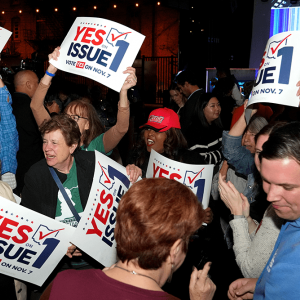
Supporters react to the passage of Ohio Issue 1, a ballot measure to amend the state constitution and establish a right to abortion, at an election night party hosted by the Hamilton County Democratic Party at Knox Joseph Distillery in the Over-the-Rhine neighborhood of Cincinnati, Ohio, Nov. 7, 2023. Kareem Elgazzar/USA Today Network via REUTERS.
Voters approved an amendment to add abortion rights to the state constitution by a wide margin (more than 56 percent voted for the ammendment and 43 percent voted against, with 99 percent of the vote counted according to CBS News), ending a tumultuous year of uncertainty over the future of legal abortion in the state.
PEPFAR Has Saved Millions; Pro-Life Politics Threaten Its Funding
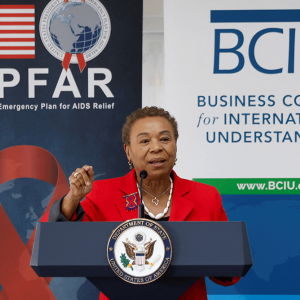
Representative Barbara Lee (D-Calif.) delivers remarks to a World AIDS Day event hosted by the Business Council for International Understanding in Washington, D.C, Dec. 2, 2022. In response to the 2023 threats to the program’s funding, Lee told Sojourners: “PEPFAR is the most successful foreign assistance program in history—failing to renew it would be devastating for millions ... We have a moral imperative to get this done and keep saving lives.” REUTERS/Jonathan Ernst
Over the past two decades, the United States has saved millions of lives by investing $110 billion in the U.S. President’s Emergency Plan for AIDS Relief, which aims to end the AIDS crisis by 2030. More than 25 million lives have been saved since PEPFAR launched in 2003, and 5.5 million babies who would have been born with HIV were born virus-free.
Faith Activists Urge Congress to Resurrect the Child Tax Credit
During the pandemic, something peculiar happened: The child poverty rate in the U.S. fell, reaching an historic low of 5.2 percent in 2021. The decline was largely a result of the federal spending in social safety nets like Medicaid, SNAP, and the Child Tax Credit, as well as direct payments to families. Anti-poverty advocates celebrated the win.
When Kids Need More Than the Church Can Give
The arrival of a child into a religious community usually sets off a flurry of activity. Someone usually organizes a meal delivery. A pastor might visit the hospital. Older parents often reach out with words of advice to the younger, sleep-deprived new parents. But when that child is born with a severe or chronic medical condition, families need more than the church can give, said Matt Steinhauer, a retired minister with the Evangelical Lutheran Church in America, former insurance broker, and the parent of a son with Down syndrome.
What Families With Disabled Kids Need From the Church
Becky McMains spends most of her life in “advocate mode.” Her 9-year-old daughter was born with spina bifida and requires substantial medical intervention and special education services. She uses mobility aids to get around and has speech delays. In doctors’ offices and schools, Becky’s questions, recommendations, and even pushback have led to change, not just for her daughter, but for other children as well. But when McMains brings her advocacy to church, she said, the response is different.
Young Evangelical Activists Face a Key Climate Barrier: Their Elders
In the year 2050, when today’s 3-year-olds will be 30-year-olds, climate scientists expect the height of the slowly unfolding climate disaster to have arrived. The specifics vary slightly, but most experts warn that some regions will face extreme drought while others are entirely flooded with sea level rise. Dangerous heat and humidity — as some regions of the U.S. have faced this summer — combined with poor air quality will make it dangerous to be outside for a growing portion of the year in many places.
Why Black Churches Are Better at Early Literacy Than Some Schools
Joshua was one of the star students in his Sunday school class at a Black Baptist church he and his family attended; his teacher raved about Joshua’s helpfulness and engagement. But when it came to preschool, Joshua’s parents were perplexed.
“Every day the preschool teacher has something negative to say about [him,]” Joshua’s father later told researchers.
A Brief History of Religious Support for Abortion and Reproductive Rights
For the 49 years that Roe v. Wade protected legal abortion across the country, religious groups, including Catholic bishops and conservative evangelicals, became some of its loudest and best-known opponents. And when the Supreme Court overturned Roe v. Wade in 2022, many Christians claimed it as both a political and spiritual victory.
The Case for Ending Children’s Church
In May, Surgeon General Dr. Vivek Murthy declared social isolation to be a U.S. public health crisis for its link to depression in youth and increased risks for many health conditions in older Americans.
The Solution To Unused Church Space Might Be Toddlers
As congregations age and shrink across the U.S., churches find their sizable buildings often become underutilized. The solution might be found in addressing the child care crisis.
Supreme Court Upholds Tribal Sovereignty in Indigenous Adoptions Case
On June 15, in a 7-2 ruling, the U.S. Supreme Court upheld the Indian Child Welfare Act when it ruled in favor of the federal government and tribal governments in the case Haaland v. Brackeen. The case, which originated with a Texas couple’s attempts to adopt two Navajo children despite the tribe’s ability to find a placement for the children within Navajo Nation, was seen by many as an attempt to fundamentally dissolve tribal sovereignty




